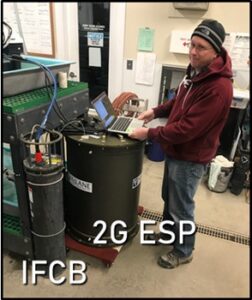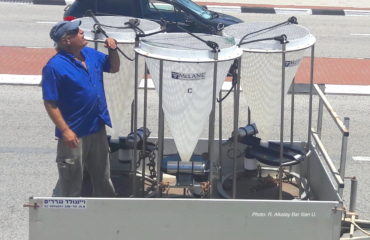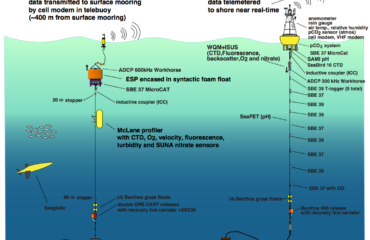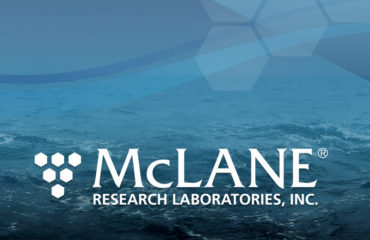
Image: NCCOS (full article link below)
Scientists from the National Centers for Coastal Ocean Science (NCCOS) and their collaborators at the Woods Hole Oceanographic Institution (WHOI) are co-deploying McLane Environmental Sample Processors (ESP) and Imaging FlowCytobots (IFCB) at various locations to monitor toxic Pseudo-nitzschia until the upcoming spring. Deploying these two advanced technologies together allows for simultaneous, real-time monitoring of changes in cell and toxin concentrations, enhances the precision of toxin analysis, and offers resource managers early warnings of toxic bloom development. It also facilitates adaptive triggering of ESP toxin analyses, optimizing the targeted and efficient use of reagents.
To ensure precise quantification of toxin levels throughout the upcoming deployments, NCCOS visited the WHOI-LOSOS facility to calibrate the NCCOS-designed domoic acid (DA) sensors on three WHOI ESPs, each affectionately given a nickname such as ‘ESPshorty’ for ease of tracking individual deployments. ESPshorty, equipped with its DA sensor, embarked on its mission on August 24th, accompanied by an IFCB, mounted on a WHOI-designed pontoon barge near an aquaculture site in Salsbury Cove, ME to monitor toxigenic Pseudo-nitzschia cells and DA. Simultaneously, two additional ESPs with DA sensors are being deployed with IFCBs at Bowdoin College Schiller Coastal Studies Center (ESPjake) and URI-GSO pier (ESPdon, deployment pending completion of pier upgrades). These deployments aim to monitor Pseudo-nitzschia and DA in Harpswell Sound, ME, and Narragansett Bay, RI, respectively.
To ensure timely dissemination of data, regional shellfish managers will receive updates via an email listserve, followed by broader distribution through the WHOI HAB hub.
The ESP is an in-situ electromechanical, fluidics system designed to collect discrete water samples, concentrate microorganisms or particles, and automate application of molecular probes in order to identify microorganisms and their gene products.
The IFCB is an in-situ automated submersible microscope that generates images of individual cells or particles in-flow taken from the aquatic environment that can be used for taxonomic classification.
Watch a video about the IFCB
https://mclanelabs.com/ifcb-videos/



